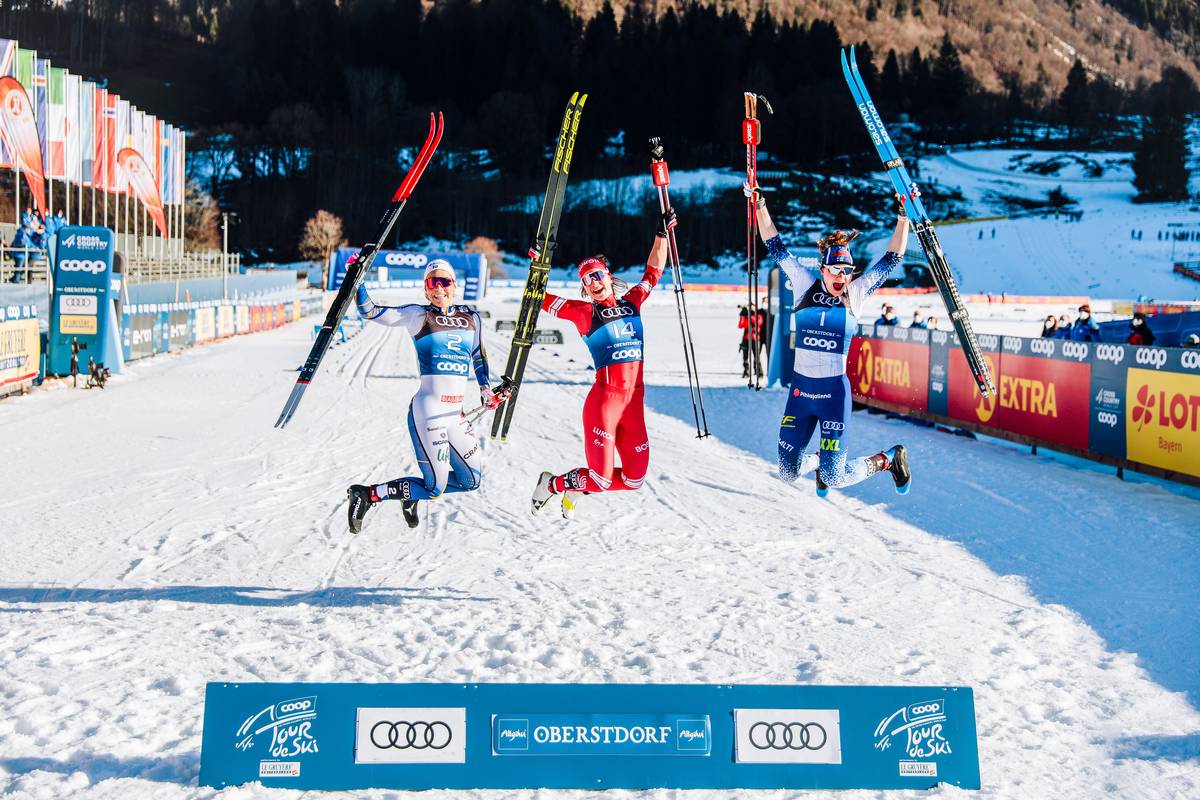
This World Cup coverage is m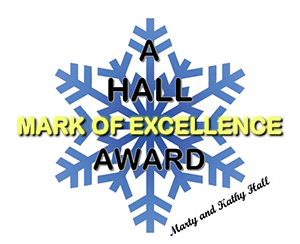 ade possible through the generous support of Marty and Kathy Hall and the A Hall Mark of Excellence Award. To learn more about A Hall Mark of Excellence Award or to learn how you can support FasterSkier’s coverage please contact info@fasterskier.com.
ade possible through the generous support of Marty and Kathy Hall and the A Hall Mark of Excellence Award. To learn more about A Hall Mark of Excellence Award or to learn how you can support FasterSkier’s coverage please contact info@fasterskier.com.
Every Grand Tour must have a Queen Stage. Dreamt up by organizers, meant to stand at the crux of the race, animate its characters, and start the action towards resolution in the narrative that’s formed over its early stages.
In cycling, these are the iconic places where grand settings meet grand drama – Alpe d’Huez, Mt. Ventoux, or the Angliru. The Queen Stage comes with pomp and circumstance, like a coronation or diamond jubilee.
At this year’s Tour de Ski though, the Queen Stage in Oberstdorf — and this 1.2-kilometer Classic Sprint proved to be just that — was more like a queen’s address to parliament; an agenda laid out for how this Tour will go into its final stages in Val di Fiemme, Italy, negotiated through the tricky rules, regulations, and politics of ski racing on the World Cup.
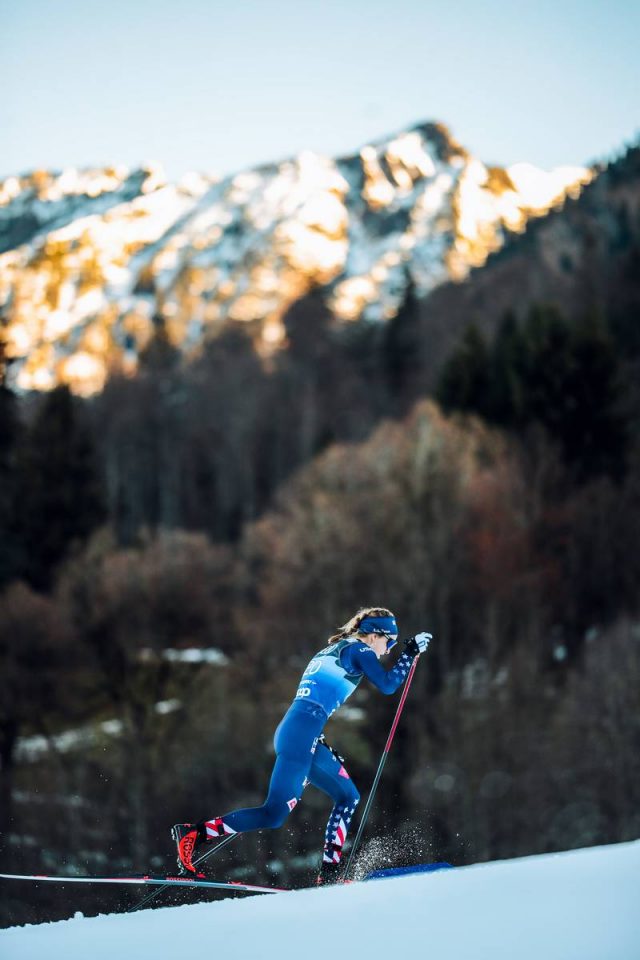
Coming into the day, there was a set order in this year’s Tour de Ski overall classification that matches what you would expect if you just watched the races individually. After a Stage 1 victory in the freestyle sprint, and an exciting 10k freestyle victory yesterday, Jessie Diggins (USA) wore the yellow leader’s bib. Below her was Stage 2 winner Kertuu Niskanen (FIN), and then Natalia Nepryaeva (RUS) in third. The time gap between the three, however, was relatively small. Diggins, despite her two wins, only had a 13 second advantage over Niskanen. With time bonuses for the finalists and semi-finalists in the Stage 4 Classic Sprint all well above that threshold — ranging from 60 sec for the winner to 22 sec for the last semi-finalist finisher — the 1.2k loop at Oberstdorf had the potential to animate and transform the overall classification in an instant. And that’s what happened. Call it a Queen Stage.
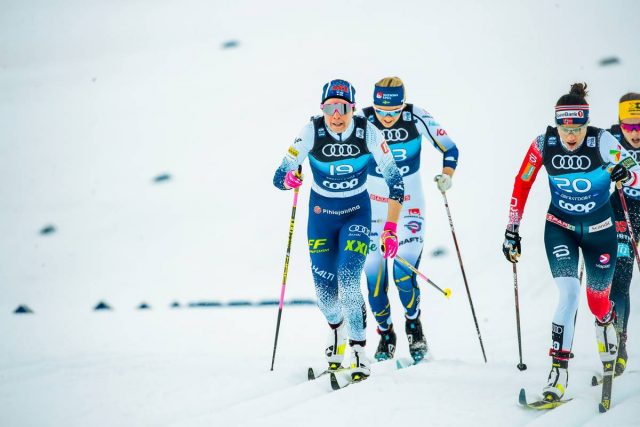
The day started strong for the Americans, with Diggins qualifying 7th (+3.43) and Katharine Ogden joining her in heats after qualifying 26th (+7.94). Diggins’ two closest rivals both qualified off her pace, with Nepryaeva in 13th (+5.08) and Niskanen in 18th place (+6.10).
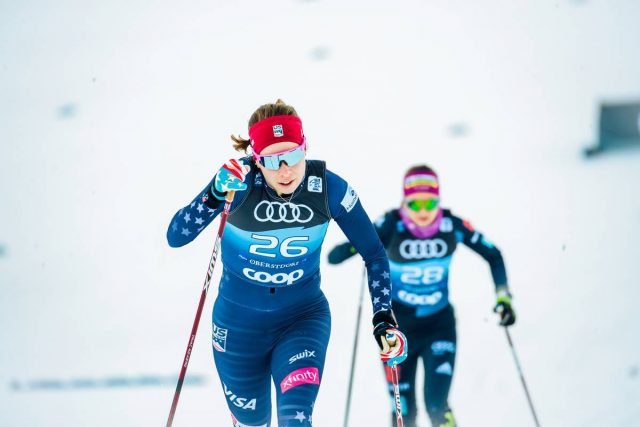
Ogden would meet Nepryaeva in her quarterfinal, where they set out to race a 1.2k sprint course that featured two punctuated climbs, with a technical downhill sweeping to the right in between. Their heat was a fast one, with Ogden establishing herself in the field behind Anamarija Lampic (SLO), then coming off the top of the first climb in fourth place. As the field spread out across the second climb, Nepryaeva came off the top first, with Lampic in tow. When they came out of the downhill into the long, straight, finishing straight, Nepryaeva had the lead, but Lampic showed a fight to regain her 2nd place ahead of Greta Laurent (ITA). In the excitement, Ogden had been left out of the pack slightly, and came across the line in 5th place.
Where this Tour really turned on its head though, was in Diggins’ quarterfinal heat. Lined up against a field that included qualifier winner Johanna Matintalo (FIN), Tatiana Sorina (RUS), and Frida Karlsson (SWE), the heat was a tense affair from the gun. Sorina led out over the first climb, and Diggins successfully jockeyed for position coming out of the first downhill. In the approach to the final climb, a slight left-hand turn became the setting for the defining moment of the day.
As Diggins recounted in an interview with U.S. Ski & Snowboard cross country communications manager Tom Horrocks:
“I was in the track, Frida [Karlsson] was double-poling outside the track, and then moved in on me, so I moved to switch lanes, she switched on top of me, and caused me to fall – which is a huge bummer… that severely impacts my tour.”
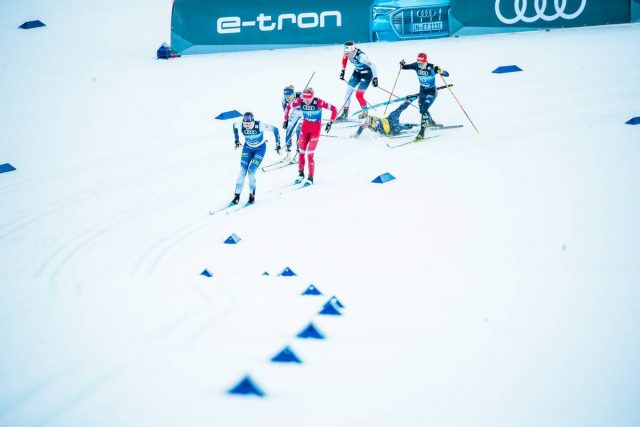
It severely impacted the World Cup season too. Diggins crossed the line in 6th, but before the following heat had hit the first climb the FIS jury had already come back with a yellow-card and disqualification for Frida Karlsson. As a result of it being Karlsson’s second yellow-card of the season, her first arriving in the same event in Ruka back in November, she was also given a 3-minute time penalty in the overall classification for the Tour de Ski.
That calls to question whether the World Cup’s best distance racer this season will continue to race the Stage 5 10k mass start classic in Val di Fiemme or forgo the end of the Tour altogether. While she started the day in 7th place and +45 sec off Diggins, the 3-minute penalty dropped her to 44th place (+4:30).
Despite the penalties against Karlsson, Diggins’ quarterfinal time and placing were unaltered, leaving her out while both Niskanen and Nepryaeva advanced to the semi-finals, where the time bonuses for just finishing automatically exceeded the margin of Diggins’ lead in cumulative time standings. Diggins was awarded a 4 sec bonus for her quarterfinal finish, so a net 18 sec gain was at least guaranteed. In an instant then, two of the World Cup’s most compelling stories this season veered towards drastically off course. Diggins’ title-defense now faces steep odds (and a steep climb in Stage 6). Karlsson finds herself further down in the pack than she has been all year.
The semi-finals then, marked a brave new Tour de Ski.
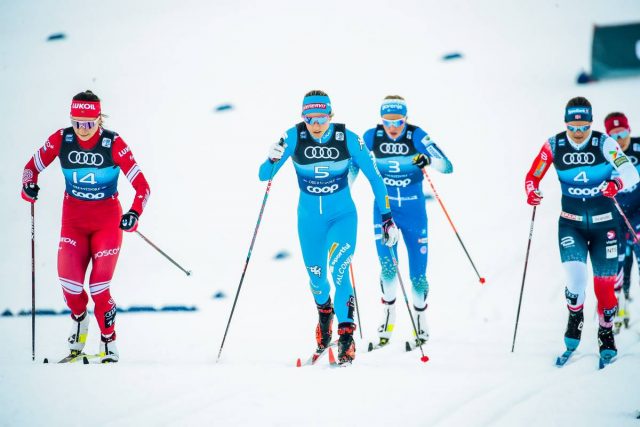
Nepryaeva raced through her semi-final with a tactical approach carried over from the quarters, preferring to stay with the pack led out by Matintalo and Johanna Hagström (SWE), before pushing the last climb and setting herself up for the long double-pole finish – for which she looked stronger than anyone else in the field. She won a semi-final that stayed tight and stayed fast, sending both lucky losers to the final.
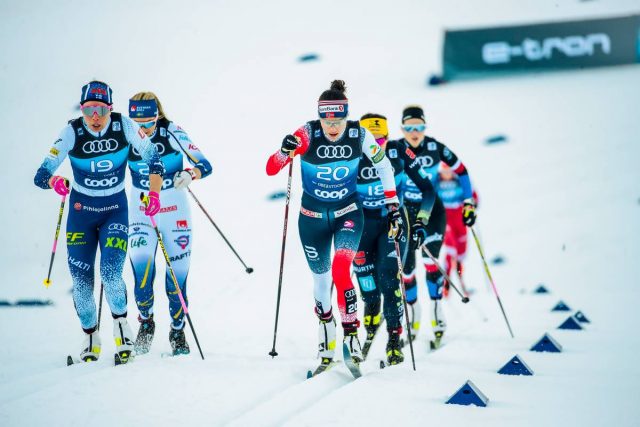
Niskanen would line up in the second semi-final. She matched up against Lampic, Laurent and Mathilde Myhrvold (NOR), with the former two looking to lead the race from the gun. By the time they crested the final climb, Lampic had stretched out the field and Niskanen had been caught out the back. She finished fifth in the heat, and didn’t advance to finals. Lampic carried the heat, and Myhrvold came second.
Nepryaeva then, would be playing a game of seconds for the Tour lead. And she would be playing it, skiing the course, like she had all day. Lampic, Hagström and Matintalo formed the front of the pack, while Nepryaeva waited for the last climb to swing out and throw a burst of acceleration that saw her and Hagström come over the top together. As Nepryaeva came out of her tuck on the finishing stretch, the strength of her double pole was on full display. She crossed the finish line first, and with a scream that no doubt will echo all the way to Val di Fiemme to warn that there is a whole new dynamic coming to its courses when the Tour resumes after the rest day tomorrow.
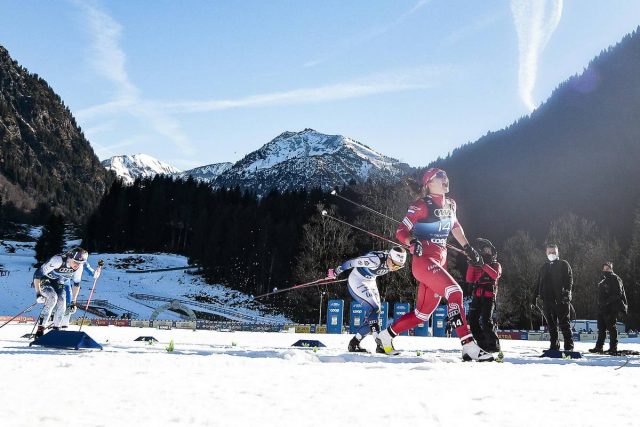
That new dynamic is a new order. Standings going into Italy: Natalia Nepryaeva in first (53:40.0), Kerttu Niskanen in second (+34.0), and Jessie Diggins third (+38.0).
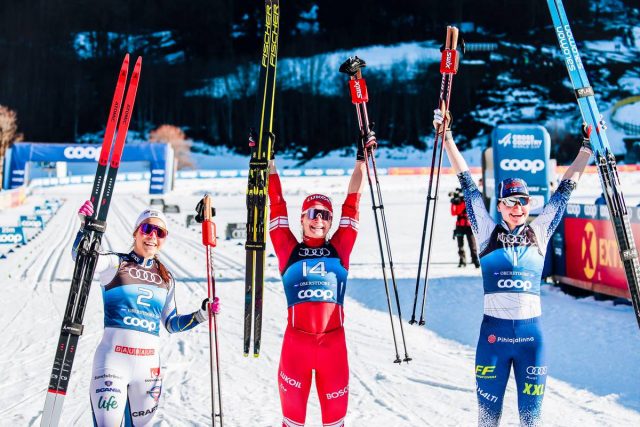
With two stages to ski though, the gaps in this year’s Tour de Ski are nowhere from definitive. When it was alluded that her misfortune may change her tactical approach to the last two stages in Italy, Diggins replied simply, “it’s still full throttle everyday. It has to be.”
Full audio clip from post-race interview with Jessie Diggins, hosted by Tom Horrocks:
The Queen Stage of Oberstdorf may have made its sound and fury, but ultimately this race and its story are far from their conclusion, and it still contains a character in Diggins who has proven so-often that she can make us throw out all of the books.
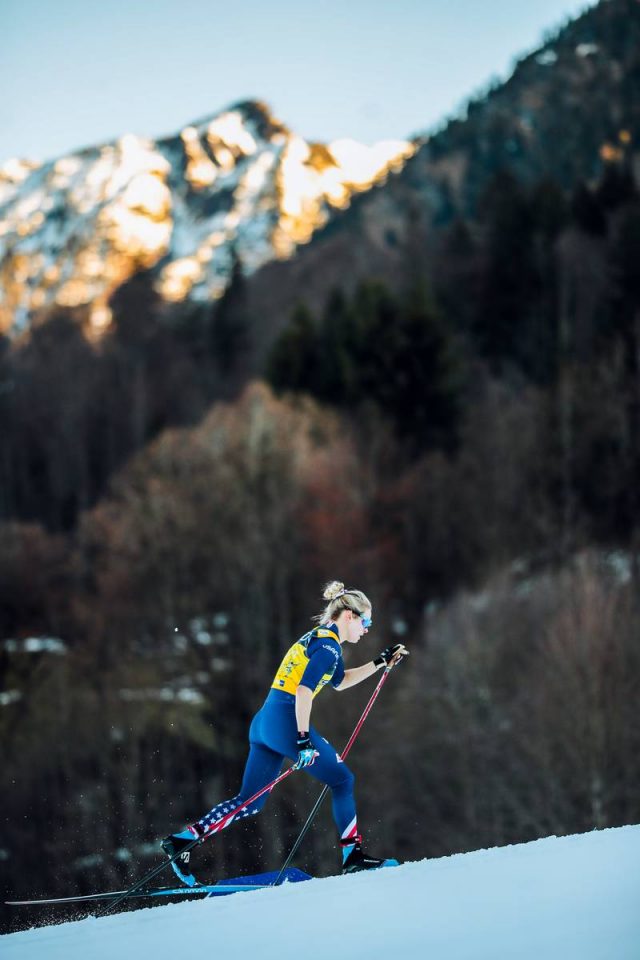
After final results were decided, Diggins ended her day in 21st, with Ogden a few places behind in 24th.
Outside the Top-30, the U.S. had strong results in the qualifier. Alayna Sonnesyn finished in 43rd (+14.93), Novie McCabe finished in 54th (+18.45), and Sophia Laukli finished in 61st (+26.87).
Both Hailey Swirbul and Julia Kern have dropped from the Tour, each sharing on social media that they have a cold and are focused on recovery.
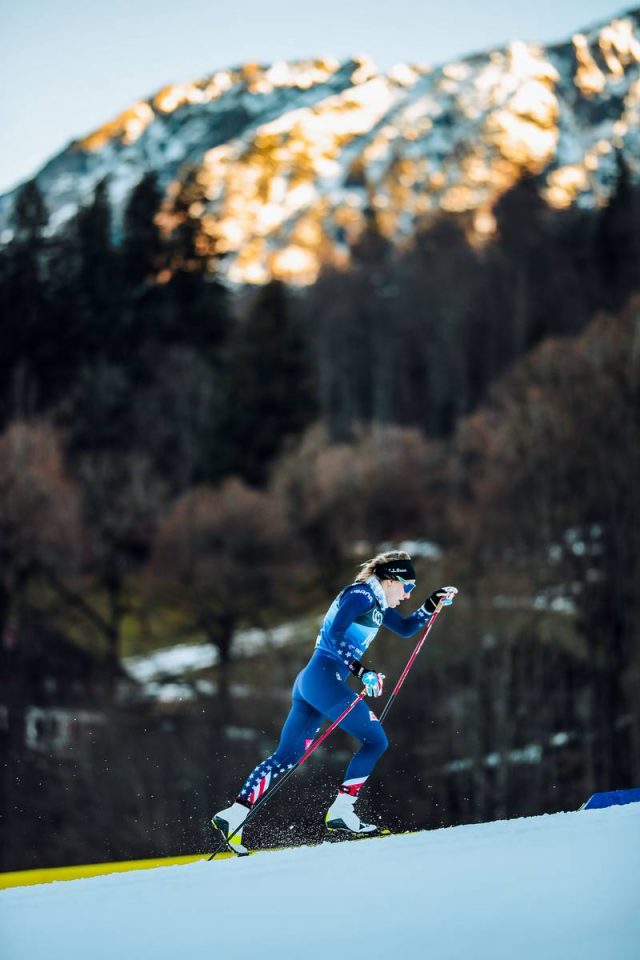
Results:
Qualification | Final
Tour Standings After Stage 4:
Cumulative Time | Points
Ben Theyerl
Ben Theyerl was born into a family now three-generations into nordic ski racing in the US. He grew up skiing for Chippewa Valley Nordic in his native Eau Claire, Wisconsin, before spending four years racing for Colby College in Maine. He currently mixes writing and skiing while based out of Crested Butte, CO, where he coaches the best group of high schoolers one could hope to find.



